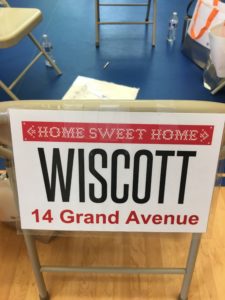The (Mental) Weight of Poverty
“One of the most consistently replicated findings in the social sciences has been the negative relationship of socioeconomic status with mental illness: the lower the socioeconomic status of an individual, the higher the risk of mental illness” (Hudson 2005, 1). The lives of women in generational poverty are filled with many challenges, often compounding each other. These women experience stress, grief, and depression without the resources or networks in place to manage these strong emotions appropriately and healthfully.
Our Inspire Atlanta participants experienced a taste of the stress women and their families living in poverty deal with on a daily basis when we hosted a Poverty Simulation for them in April. For Mental Health Awareness Month, one of the Inspire Atlanta class members has written about what the experience was like and how she realizes the critical importance of organizations that are helping low-income women with their mental health as well the tools to achieve economic self-sufficiency.
By Monica Nixon
Hi. My name is William Wiscott. I’m seven years old. My sister is nine. We used to live with our mom. But we live with our grandparents now because, well, my mom just got sent to jail. She used drugs a lot and she got caught.
Me and my sister, we love Pappy and Grammy, though. Pappy can’t get around that well. One of his legs doesn’t work too good, so he needs help a lot. My sister helps him mostly, but I do sometimes, too. Pappy can’t work, so Grammy works all the time.
I ride the bus to school with my big sister. I don’t like school much, though. I mean, it’s ok, but I get bored, and then I get in trouble for talking to my friends and getting up out of my seat too much. I got a bad mark on my conduct because I’ve been getting in trouble a lot. I think Grammy is a little mad at me. She said she might lose her cashier job if she has to keep leaving work to come to the school every time the principal calls her to come get me. I don’t want Grammy to lose her job. I try to be good, I swear.
The other day, I heard Pappy and Grammy talking about money, I think. Pappy needed to buy his medicine for his diabetes, but Grammy said we had to pay our mortgage or the people would cut off our lights and take our house. And she said we need to buy some food, too, because she hasn’t been to the store in two weeks. Me and my sister usually try to eat a lot at school, just in case we don’t have dinner. Well, I guess that means no school field trip to the zoo for me and my sister. I really wanted to see the tigers. I like tigers.

Recently, I participated in a Poverty Simulation as part of The Atlanta Women’s Foundation’s Inspire Atlanta program. We were grouped into “families,” and each family was assigned a profile. In my family, I was William Wiscott – a seven-year-old boy with ADHD, living with his sister, and being raised by his grandparents because his mom was in jail and his dad wasn’t in the picture.
The goal of this one hour, simulated experience was to give participants a better understanding of a month in the life of a family living in poverty. The families came in all shapes and sizes – young, single parents, grandparents raising grandchildren, elderly widows on fixed incomes. Families visited pawn shops to sell items when money ran low, paid exorbitant fees at check cashing establishments, were turned down for medical assistance for making “too much money,” and made daily choices between food, shelter and medication for chronic diseases. We went from one “15-minute week” to the next with one goal – to survive.
This was our experience for only one hour. It’s reality for 48% of female-headed households (single w/ or w/o children) in the city of Atlanta who live in poverty. That’s. nearly. HALF.
For the poverty simulation, ours was a “two parents” household. But the weight of the family’s survival rested squarely on the shoulders of one woman – “Grammy.” She was the only one able to work each day. And even in simulation mode, she visibly wore the intensity of her responsibility.
As a child in the scenario, I wondered things like, “Would Grammy get to cash her check and pay the rent in time? Or would we get evicted like some of our neighbors? And what if Grammy and Pappy didn’t have to take care of me and my sister? Would Pappy then be able to pay for his medication?” I was well aware of the strain and that I was helpless to change the situation.
A month later, thoughts of my “experience” as a child in poverty continue to churn. I consider how children are such an important part of a family’s equation. They are dependents in every sense of the word. I marvel at the skill, creativity and determination it takes for a mom to make sure her children feel loved, valued and protected while struggling to provide for them. And I commit myself even more to do my very small part to support organizations that support women like Grammy – organizations that provide mental health care, job skills training, education, childcare and other services that help lift them from under the weight of poverty into a place of self-sufficiency.
Monica Nixon is a B2B Marketing Proposal Manager and Community Engagement Champion for Assurant, Inc., a fortune 500 company in Atlanta, GA. In addition to her role as a proposal manager, she works closely with the Assurant Foundation to build relationships with core charitable partners, organize corporate volunteer teams and coordinate community engagement events in support of organizations like Covenant House Georgia, Make-A-Wish Georgia, Junior Achievement of Georgia and United Way of Greater Atlanta. Beyond the corporate walls, she is a writer, speaker and community volunteer with a passion to serve women and girls. Monica is a member of the inaugural class of AWF’s new program Inspire Atlanta
